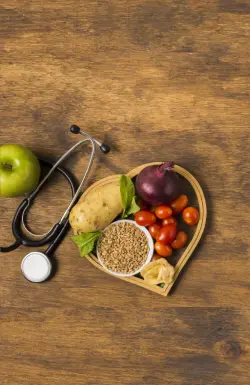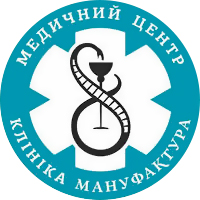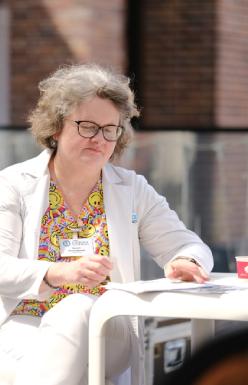
Nutrition during chemotherapy
Chemotherapy treatment does not require adherence to a diet. However, there is a need to have a balanced and nutrient meals. It helps the body cope with the load caused by chemotherapy, restore new cells and tissues, and ensure the full functioning of its systems. Speaking about diet as a limiting certain foods or emphasizing other types of foods, it can only be used when there is a reaction to the medication from the digestive system because of chemotherapy. In this case, the diet is aimed at helping digestion and easing the patient's condition. In general, the patient's diet should provide the body with a sufficient amount of macro- and micronutrients as well as calories.
Macronutrients include basic food substances such as proteins, fats and carbohydrates, the need for which is measured in tens of grams for the body. When absorbed, they release the energy needed to perform all body functions, a certain amount of them participates in the processes of building cells and tissues, synthesizes enzymes and other physiologically active compounds.
Micronutrients are small physiologically active compounds needed by the body in small quantities. They take part in the assimilation of energy, the regulation of body's functions and in the processes of body's growth and development. Micronutrients include distinct amino acids of food origin, higher fatty acids, vitamins and provitamins, minerals, dietary fibers, etc.
Macro- and micronutrients are usually referred to collectively as nutrients. It has been scientifically proven that the lack of nutrients and biologically active components in the human diet reduces the body's resistance to the harmful effects of the environment, causes immunodeficiency, disrupts system functions, reduces the effectiveness of medical measures, etc. That is why proper nutrition of the patient is no less important than chemotherapy itself.
How to eat during chemotherapy
Choose high-calorie products or specialized medical nutrition, it is balanced in terms of the amount of necessary nutrients.
Eat small portions, but often. It is mandatory to include a large amount of vegetables and fruits in the diet. The diet should be varied. The best practice shows the drawing up a weekly menu is very helpful in regard to control the balance and variety of products.
On the day of chemotherapy, we recommend to eat a light meal and it is strongly required to have a large amount of liquid (10-12 glasses of caffeine-free drinks).
Does the taste change during chemotherapy?
Yes, during chemotherapy, the perception of taste and smell of products changes. This usually affects the patient's appetite. Therefore, nutrition becomes the same therapeutic task for patients as discipline in accepting treatment.
The patient should remember that unpleasant sensations of taste and smell disappear within 2-3 months after the chemotherapy courses finished. It is easier if the daily diet is divided into small portions. If the appetite disappears completely, it is allowed to skip one meal, but the amount of drink per day should not be reduced.
What products are recommended
A daily balanced diet should include products from each group of macronutrients and micronutrients. This means that the patient should consume the following products daily:
- Vegetables and fruits, with an emphasis on fruits. They can be consumed in various forms - fresh, boiled, stewed, canned, in the form of juices, purees, compotes. Fruits provide the necessary carbohydrates and are a source of energy. Vegetables give less energy, but provide the body with fiber. Both of them contain vitamins and minerals.
- Animal protein: meat, fish, eggs, milk and dairy products. In addition to protein, these products provide us with vitamins and minerals. During treatment, the taste of meat becomes unpleasant for many patients, they complain of aftertaste of metal and bitterness. Cooking meat in vegetable sauces often helps to improve the taste.
- Vegetable protein: legumes (peas, lentils, hummus, beans), nuts. If, however, the patient has a indigestion as a side effect of treatment, these products shall have to be abandoned on the days of the chemotherapy course.
- Bread and cereals belong to easily digestible products. They provide the body with carbohydrates, vitamins, minerals, and partly proteins. This group of products includes, among other things, pasta and cereals.
- Dairy products are often singled out as a separate part of the diet because of the vitamins, minerals and fats that riches this food group. All kinds of dairy products will be useful to the patient: hard cheeses, cottage cheese, yogurts, sour milk, fermented milk, butter, cream and ice cream. It is important to control that the product is made from dairy and not vegetable fats. Many patients have heartburn or difficulty digesting dairy products as a result of the treatment. We recommend to combine dairy products with products from the bread group to reduces heartburn. Cottage cheese is better digested with boiled beets or carrots, as well as potatoes.
The benefits of a diverse products combination are also in the fact that protein quality improves when those from different groups are combined.
Why is it important to drink a lot?
Medicines used in therapy affect the kidneys and bladder. It is important to remove their rests from the body, so heavy drinking is a special requirement on the day of receiving chemotherapy. The recommended norm is 10-12 glasses of liquid without caffeine - water, compote, broth, etc.
Remember:
- One of the indispensable conditions for a doctor to prescribe chemotherapy is a good condition of the patient, which largely depends on nutrition.
- Your diet can ease and often mitigate your body's side effects to chemotherapy.
- A complete and balanced diet improves the body's internal reserves, supporting immunity and increasing the absorption of medicines.
Make an appointment
Your name
Phone number
Direction
Desired date
Comment













